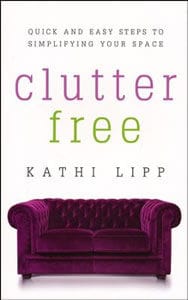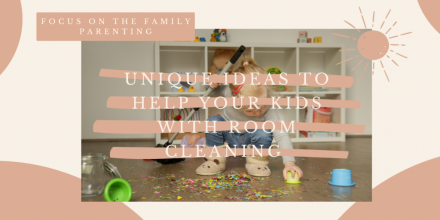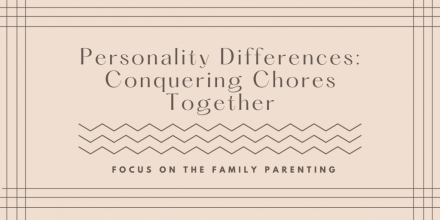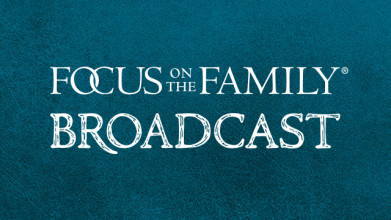John Fuller: This is John Fuller. And on today’s Focus on the Family with Jim Daly we’re gonna take a look at what it means to live clutter free. And it might be that home organization isn’t a problem for you or perhaps, like most of us, it’s the story of your life.
Teaser clip:
Husband: Oh, where is my tie? I’m in such a hurry. Honey, where is my green tie?
Wife: Oh, honey, I think you left it by your bowling ball.
Husband: How’s, honey, where is my bowling ball?
Wife: You know what, I think it’s on top of the dictionary.
Husband: Honey, where is the dictionary?
Wife: Behind the couch.
Husband: Behind the couch? What would it be doing behind the couch? Oh.
John: (laughs)
Jim Daly: All right. I don’t think it’s quite that bad at my house.
John: At least you could find the couch. I mean, that’s…
Jim: Well, right. That’s the key.
John: Okay.
Jim: I mean, how many times have you stood in front of a refrigerator, John, and said, “Dena, where’s the milk?”
John: You mean like in the past 24 hours? (laughs)
Jim: (laughs) Yeah, pretty much.
John: How many times, yeah.
Jim: Yeah. I mean, I’ve done that more than once.
John: Mm-hmm.
Jim: You know, the yogurt, whatever it might be.
John: If it doesn’t jump out and bite you, you’re not gonna find it.
Jim: Pretty much. I think there’s a gene that men possess that blinds us to something right in front of us (laughs)
John: Quite possibly. Yeah.
Jim: But you know what? I try to be kind of organized. I am…
John: No, you’re very organized, Jim.
Jim: …well, I don’t know about that. Very might be too generous, but I think if Jean were here, she would say (laughs) she’s quite the opposite.
John: She’s a busy mom.
Jim: She’s actually the definition of a perfectionist because it so overwhelms her that she just finds it hard to get started. And she does much better than when we were first married (laughs). But she’s not here to defend herself. So I’m gonna say my areas, I’ll throw stuff away. She’ll say, “Where’s that phone number I had on the counter?”
John: (laughs)
Jim: And I’ll go, “Ooh, it’s in the bottom of the trash.”
John: ‘Cause you efficiently came through and cleaned everything.
Jim: I’m a little too fast with that. That’s my problem.
John: You’re kind of quick at throwing stuff away.
Jim: (laughs) But today we want to talk about that idea of becoming clutter free. And this is one of the big issues in marriages. And if I’m not scratching where you itch, I think at the end of today’s program, you’re gonna feel, “Yeah, maybe I do have an issue here.”
John: And we have a clutter free expert with us.
Jim: (laughs)
John: Kathi.
Jim: Did you say clutter freak? (laughs)
John: (laughs) Well that could fit. I don’t know. Let’s find out.
Jim: I think you meant clutter free.
John: As we talk to Kathi Lipp, let’s just find out if she’s a clutter freak or a clutter free expert. So…
Kathi Lipp: Is there going to be a diagnosis involved? Awesome.
John: Yeah. Well, you’re at Focus on the Family.
Jim: That’s
John: We specialize in that. No, it it’s great to have Kathi on. She is such a humorous, energetic, insightful person. And she could deliver bad news with a smile, and you’d feel good about it for some reason.
Kathi Lipp: (laughs)
John: I don’t know. She’s got this gift to make any idea, make sense. And you just want to try it. So I’m really looking forward for other people in my life to hear this project.
Kathi Lipp: (laughs)
Jim: Oh, come on. You are in bad shape, John. Kathi, welcome back to Focus.
Kathi Lipp: Oh, yeah. Best intro ever.
Jim: (laughs)
Kathi: And I love being with you guys, you know that.
Jim: I don’t know about that, but now you did not start…you didn’t come outta your mother’s womb all buttoned down organized.
Kathi: Uh, no.
Jim: You had to learn this the hard way.
Kathi: No.
Jim: So that makes a lot of people feel better right there that you’re not…
Kathi: Right.
Jim: … perfection.
Kathi: Oh, people get terrified when I’m coming over to their house. They’re like, “It’s the clutter free lady.”
Jim: (laughs)
Kathi: I’m like, “You know what, let’s be honest. Your house may be more clutter free than mine.” I would say my journey has probably been more significant than most people. I actually was born to a hoarder and people use that term kind of lightly and funny. But really my dad was a hoarder.
Jim: What did that look like? ‘Cause a lot of people don’t experience that.
Kathi: Yeah. You know, people ask me all the time, “Have you seen the show? And I’m like, uh, no, that’s childhood trauma on TV for me.”
Jim: (laughs)
Kathi: But my mom had to work really hard to keep him contained. So I remember growing up, he had the garage and he had what we called the office. Things were stacked up, I’m not exaggerating, probably four or five feet. And there was a path in the garage to his desk. He had a little desk out there. He was an electrical engineer. So he was soldering stuff and things like that. And a path to the mailbox, which was in our garage and up in his office, there was a path to his desk.
Jim: What created the path though? What do you put around you that, you know, that would…?
John: What would…
Jim: What will only allow you to walk in certain spaces?
Kathi: Well, it was very funny when I was writing this book, my editor said, “You know, you said that your dad had piles and piles of stamps.” He said, “Do you mean postage stamps?” And I said, “Yes.” He goes, “How could you have five-foot piles of postage stamps?” And so I sent him a picture because people don’t believe me, but it would be in binders and things like that. But so many postage stamps from all over the world, that was one of the things he collected. Electronics parts, National Geographic magazines.
Jim: (laughs) I like your dad.
Kathi: No.
Jim: That is awesome.
Kathi: You know, he was a guy who went deep in his interests, but he had a lot of interests. But I would say that a lot of his stuff caused a lot of barriers in our family, physical and emotional. Because my dad was so into his stuff. I’ll never forget when they moved houses. It took all of us. I’m talking my husband, my kids, my brother, his friends, to go through all that stuff. And it was a pretty traumatic experience for my dad.
Jim: Was that your mom’s plan to clean up?
Kathi: Yeah.
Jim: Was to move house?
John: (laughs)
Kathi: Well, I think, you know what?
John: Forces the issue.
Kathi: It really was. It forced the issue and it got to a point where the only person my dad would talk to was me because he felt so attacked. And we weren’t attacking him, but we were asking about his stuff.
Jim: Well, let me ask you this, because growing up in that kind of environment, it can make you anti clutter.
Kathi: Right.
Jim: But you weren’t that.
Kathi: No, I didn’t really know how to deal with things. And I formed some kind of weird emotional attachments to things which I thought were weird at the time.
Jim: What does that, I don’t know, what does that look like?
Kathi: Well, I really think that clutter comes down to a couple of things. It’s well, three. Fear, guilt, and shame. Fear, “If I get rid of that, what if I need it later on?”
Jim: Like, maybe like four years from now.
Kathi: Right, exactly. And exactly. And to, to think about spending the money a second time on something…
Jim: mm-hmm.
Kathi: … is paralyzing. My mom was raised by, you know, people who went through the depression. And so this idea was passed down to me that we don’t waste. And so, if I could possibly use it again, then I would do it. So the fear, the guilt. Oh, “You know, Aunt Edna made that for me.” Now, I would never wear that, but she made it for me. So the guilt that is associated to stuff. And then shame, “I spent so much money on it. How could I ever give that away?” You know, “Those boots, well they pinch me every time I walk and so I don’t walk in them. But I spent so much money on them. I had to have them; I have to keep them.” And so that really built up a lot of my clutter.
Jim: Kathi, in your book you refer to a popular motto that existed in World War II. Jean and I talked about it. We failed to remember ’cause we weren’t here, but our grandparents, for example…
Kathi: Right.
Jim: … who knew what it meant to live in a rationed world, I mean…
Kathi: Yeah.
Jim: … clothing, and food, and butter, and milk.
Kathi: Yeah. Right. (laughs)
Jim: You wouldn’t have six gallons of milk in your refrigerator.
Kathi: Yeah.
Jim: What was that motto and how was the attitude of people during that time?
Kathi: Yeah, the motto was, “Use it up, wear it out, make it do or do without.”
John: Mm-hmm.
Kathi: And what that really said is, we have limited resources. Whether it was because of the government, you know, whatever was going on there, there wasn’t enough finances, whatever that was. So they really had to either figure out how to do without it or use up what they had. You know, it’s very easy in today’s day and age to get disenchanted with your hairspray, so you go buy a new one. And then you have 16 bottles of hairsprays that are half used sitting in your bathroom. And so one of the things that Roger and I challenged ourselves to do, and it wasn’t as big of a challenge for Roger, let’s just be super clear…
Jim: (laughs)
Kathi: … was to use up all the cosmetics I already had, the hair products. And if I said, “Oh, I’m never gonna use it again,” either pass it on to one of my girls or get rid of it. Because what was happening is, I felt like I didn’t have the stuff I wanted, but I had so much stuff. And so, I didn’t know what I had anymore because there was so much stuff. So, you know, just using it up, wearing out. I now really try. I buy expensive shoes, ’cause we talked about plantar fasciitis when we were talking earlier before the broadcast. My shoes are very expensive.
John: Your feet are important to you.
Kathi: My feet are very, very important to me. I kind of, I’ve grown attached to them. Yes.
Jim: (laughs)
Kathi: And so, instead of buying new shoes I have mine resoled, which sounds like such a 1950s kind of thing.
Jim: Oh, I’ve done that, yeah.
Kathi: Yeah. But so I’m going to wear it out. I’m gonna make do with what I have. Especially when my kids were in school. We would go to Target and buy all these supplies every time they had a project until you realize you have everything you need. And so, can we just make do with what we already have. And then can I do without? There’s something that happens for me and my friends when you get something new. It’s very fun and exciting for a second. But it’s not so fun and exciting when you’re buying it with a credit card, and you see that come through. Or you get home, and you realize I had something almost exactly like it. And so there is kind of a pride that I have now, when I say, “You know what, I’m good.” I don’t need to have that. I have everything I need. And I feel smarter because I actually am really trying to make things work that I already have. It’s a good way to live. It really is.
Jim: That that’s really good insight. You know, I remember Jean and I did a garage sale.
Kathi: Uh-huh.
Jim: And, you know, I was very aggressive in getting rid of all that I could get…
Kathi: Yes.
Jim: … rid of. Jean was, you know, holding some things back.
Kathi: mm-hmm.
Jim: But we put out, and it was well organized, let me tell you.
Kathi: I bet.
Jim: Clothes and books and all kinds of things, but unfortunately…
Kathi: mm-hmm.
Jim: … I had some books from friends.
Kathi: Right.
Jim: I had read the books I was done with the book, but it happened to be signed to me.
Kathi: Yeah.
Jim: Like, “Dear Jim and Jean.” (laughs)
Kathi: Yeah.
Jim: And I put that out on the table for 50 cents or a dollar.
Kathi: Yeah.
Jim: I want everybody to read that fine book.
Kathi: Yes.
Jim: And then Jean had a scarf that she had received from a friend from Africa.
Kathi: Yeah.
Jim: And that was out there. And lo and behold those two friends came to the garage sale.
Kathi: Oh, whoa.
Jim: And they, they found their items out there.
Kathi: Oh.
Jim: Now, that may have been a big mistake. We didn’t know they were gonna come by.
Kathi: Right. Right.
Jim: (laughs)
Kathi: And, you know, I would say th of the stuff we hold onto is for issues like that. “What if this person finds out? They’re gonna be brokenhearted,” that kind of thing. I totally get that. So yeah, maybe the garage sale for stuff that people who live locally could see, maybe that’s a rethinking kind of thing.
Jim: (laughs) Don’t put their gifts out on display and for sale.
Kathi: Yeah. Yeah. But you know, I also think about it like this. One time when I moved, I probably gave away, I mean 2000 things, you know, to friends and stuff like that. And one thing I regretted, you know, one thing, and I kept beating myself up. “Why did I give it away?” It was a silverware basket. It was one of those little baskets when you’re eating outdoors, has a place for the fork knives and spoons, $15, not a big deal. But I kept regretting it. And then I realized, “Kathi, it’s $15. Wouldn’t you love to be free of all of those other things for the price of $15?” You have to think about that. You are gonna make some mistakes. Hopefully they won’t crush anybody’s spirits, but…
Jim: (laughs)
Kathi: … you are gonna make some mistakes. But here’s the thing, almost anything can be bought again, almost anything. You know, and maybe next time, you know, you go through it together and you figure out, “Okay, what should we hold onto that’s not going to affect our dear relationships.” That’s my advice. Yeah.
Jim: Let’s talk for a minute about the impact on your marriage, on your family.
Kathi: Right.
Jim: Why is this inability to keep clutter free such an impact on a marriage just as an example?
Kathi: There are two things that come immediately to mind. One, the number one question I get is “How do I deal with somebody else’s clutter?” And two, I think about all the money that is spent re-buying stuff that you can’t find.
Jim: (laughs)
Kathi: You know you have it somewhere, right?
Jim: Yeah.
John: This is why we have four jars of mustard in the refrigerator.
Kathi: Yes. Yeah.
John: Yeah.
Kathi: Because you go to the store and you think, “I was out of mustard, like, six months ago, I bet we need some mustard.” And we buy stuff that we’re not going to use, or we re-buy things that we already have because we can’t find them. Our houses are so cluttered. Our drawers are so stuffed. And I think that’s why a lot of women end up buying clothes again, and again and again. Because they feel like they have nothing to wear, but it’s because they have so many clothes, things are stuffed. And I’m not just picking on women because guys ask me all the time, “What do I do about my wife’s clutter?” But then women also ask me, “What do I do about my guy’s clothes?”
Jim: So that works both ways.
Kathi: Yeah, absolutely.
Jim: Okay. Answer the question. (laughs)
Kathi: Okay. So, my first thing is, before you start pointing the clutter finger, look at your own stuff. Because our stuff, we know why we have all of that. We know what our treasures are. But then if somebody is really dealing with clutter with a spouse, I always say “Don’t fight about stuff, discuss space.” And so, what I mean by that is can we agree that your stuff, I’m not gonna tell you that your model airplane that hasn’t worked in 24 years is clutter.
Jim: (laughs)
Kathi: I’m not gonna go there because our stuff is very personal to us. “But can we agree that you get this gorilla rack in the garage, and I get this gorilla rack?” So, first clean up your own house, and I mean that in your relationship. Clean up your own stuff. And then two, agree on space. And so, even if it’s an extra room, maybe your husband has, and you say, “As long as I can close the door, that area is yours.” And it, when you start taking the emotion out of it, it becomes much easier to discuss.
Jim: But it is a highly emotional area.
Kathi: It really is.
Jim: Especially in marriage.
Kathi: Right.
Jim: In our current home, I remember when we moved in, and I got things organized and Jean was doing her part. But not long after I thought we could probably get one of those big, I mean, big flat trash bins that get delivered to your house…
Kathi: Right.
Jim: … for construction sites…
Kathi: Yeah.
Jim: … and I think I could fill that up with stuff. So I ordered it. I did ask Jean if she thought that would be okay. She said, no, that’d be fine.
Kathi: Mm-hmm.
Jim: I started throwing stuff away. And it was so funny. Because at night I’d come back to the house after work, you know, working on the weekend. I had it for about two weeks.
Kathi: Yeah.
Jim: So I’m loading stuff in there.
Kathi: Right.
Jim: And there’d be stuff pulled back out of there. (laughs)
Kathi: Right.
John: (laughs)
Jim: And I thought, wait a minute, this isn’t accomplishing the plan.
John: Who were the trash fairies?
Jim: The trash fairies were Jean, Trent, and Troy.
Kathi: (laughs)
Jim: And they were working against my great plan.
Kathi: Right. Well, one of the things that I say to people is when you’re trying to discuss as a family, what you’re going to keep and what you’re not going to keep…, Cheri Gregory, who’s a good friend of mine, who’s helped me on this book. She went through her garage, and she finally came up with this motto, which I think is absolutely brilliant. “I’m going to keep what I care about and I’m gonna care about what I keep.”
Jim: Huh.
Kathi: And so instead of keeping all of our treasures locked away in a closet ’cause we’re gonna do something with them someday, what she did, this is brilliant. Her father-in-law served in the military, and they had the flag from his memorial. And it’d been in a box for years and years. Well, you know what happens to things when they’re in a box. There are rodents, all this kind of stuff. So what she did is she got that, and she had it mounted. She had it mounted in a display case and surprised her husband with it.
Jim: Ah.
Kathi: And he said, that’s the best gift that she had ever given him. Because she cared about what they were keeping. So all those things that aren’t working that you’re gonna get to later, if you’re gonna keep it, care about it. And if you don’t care about it, somebody will. Somebody would love to have that shirt that doesn’t quite fit.
Jim: (laughs)
Kathi: Or that pair of boots that hurts you. It won’t hurt them. They’ve got younger feet than you do. We wanna be good stewards with our stuff. And when we’re hoarding, hoarding can be just your closets are stuffed. It doesn’t mean that you have rooms that are unusable. It means that you have, you know, closets that are unusable. I know that’s a very intense word for a lot of people, but I really do believe that oftentimes we are hoarding stuff because it’s a sense of safety. “If I give it away, I… ,” There’s a lot of fear attached to that. And what I’ve come to understand when we work with, especially women, in helping them get clutter free, the freedom comes when they give this stuff away. They were strapped down by it. And our little motto around our office when we’re talking about clutter free is, “We want to help people get clutter free so they’re free to go change their world.” God has a mission and a plan for each of us. And so many women are weighed down by their clutter that they’re not doing what they feel they’re called to do. And we want them to be able to go do that.
John: Well, quite an inspirational twist on a godly perspective of getting rid of stuff in your home. This is Focus on the Family with Jim Daly. I’m John Fuller, and our guest today is Kathi Lipp as she shares practical help from her book, Clutter Free. Request a copy of that and a copy of our conversation as well, the entirety of it, when you call 800, the letter A, and the word FAMILY, 800-232-6459. Or stop by focusonthefamily.com/broadcast. And as we return to the conversation with Kathi, I asked her a question about being prepared, you know, having stuff around your house for those what if situations.
Kathi: Well, and a lot of what ifs, and I’m not saying this about you, John. But let me just say, a lot of what ifs are a form of not trusting God. If I’m gonna keep everything around me, ’cause I’m gonna be prepared for every situation… And sometimes we are called to give our space, time, energy, and money. And some of us are hoarding some of our stuff and we’re spending so much of our money to maintain it, you know? The amount of storage lockers that Americans use…
John: (laughs)
Kathi: … in order to care for their stuff that they’re really never going to use is amazing. But we can justify it a million different ways. But when we think about the space, time, energy, and money that we’re spending, really on all of this stuff that we may never use again, it can sometimes be a way of saying, “I don’t need anybody else. I can take care of myself.” And as Christians, we really have to examine those motives.
Jim: That’s really good insight. You know, I’m thinking of the command that Jesus gave to the disciples to go and not to worry about what they take with them.
Kathi: Mm-hmm.
Jim: That he’d provide for them.
Kathi: Right.
Jim: That’s kind of the application there spiritually, isn’t it?
Kathi: Absolutely.
Jim: Go light because you don’t want to be burdened by a lot of stuff.
Kathi: It’s so true. Everything that we own costs us. Whether it’s insurance, or how we’re going to maintain it. Everything costs us in some real way. And I want to be in a place where if God says, “You need to move to Oregon because we’ve got ministry there for you,” I don’t want my stuff to be a factor in that decision. “I want you to go give to this family.” I don’t want my stuff to be a factor in that decision.
Jim: Kathi, in your book, Clutter Free, you talk about this visual aid or this visual concept.
Kathi: Mm-hmm.
Jim: Describe for us what you’re driving at. If we see it, it’s good. If we don’t see it…
Kathi: Right. For so many of us, the reason we have clutter is because we’re putting everything out…we feel like “If it’s outta sight, it’s out of mind.” And so we leave the permission slip on the counter. And instead of, you know, just signing that permission slip and putting it back in your kids’ backpack, you’re leaving it out to remind yourself. But when you have so many visual reminders that it becomes clutter then that’s a problem. And there was a study done recently that if you have six unrelated things on your desk, the distraction that causes is like loud music blaring in your ear. The visual distraction is as much as hearing Rock music when you’re trying to work. So that’s why having a clear workspace is usually a really good thing. There’s a small subset of really creative people. They kind of need a mess to be creative in, but for most of us, we’re using it as an excuse to never clean our desk.
John: There’s that old saying that a cluttered desk is a sign of genius, and we use that as justification, I guess.
Kathi: (laughs) Right. I think it’s also a sign of a cluttered mind.
Jim: (laughs)
Kathi: You know, here’s the thing. If your cluttered desk is working for you and you’re getting done what you wanna do, awesome. That’s great. But for most of us, clutter means that we’re distracted, and distracted is the big thing that we’re trying to overcome.
Jim: Let’s move to the strategies on how we cope with all of this.
Kathi: Yes.
Jim: I mean, we’ve got a bit of time to talk about that.
Kathi: Yeah.
Jim: You specifically encourage people to ask three questions.
Kathi: Right.
Jim: So what are they?
Kathi: Okay. The three questions are, “Do I use it, do I love it, and would I buy it again?”
Jim: Okay.
Kathi: And so if you can answer yes to all three of those questions…
Jim: Well, what’s the timeframe for, “Do you use it?” ‘Cause I might use it every three or four years.
Kathi: Well, yeah, if you have an intention in mind of when you’re going to use it…now, one of the things, one friend, her husband justified keeping a car that he’s had for seven years that doesn’t run.
Jim: (laughs) And why?
Kathi: Because he used it, because he worked on it, and he loved it. Now, that is a marital issue that needs to be discussed. But we can really eliminate a lot of clutter if we ask ourselves those three questions. Because, if say a scarf, let’s talk about a scarf, not to bring back bad memories for you, Jim.
Jim: (laughs) Ouch.
Kathi: But you know, “I liked it one time, it went with a couple of things. But do I use it?” No, “I don’t use it. I haven’t used it in a while.” “Do I love it?” Well, “No, I haven’t worn it,” you know? “That’s not my go to.” Would I buy it again?” “Definitely not.” “I need to let that go because somebody else would absolutely adore that.” Now, I do wanna say this. It’s great to give things away without any attachments. Because sometimes our parents try to give us stuff that says, “Well, I don’t like this anymore, but you should have it because it has a family thing, you know, attached to it.” “Your great Aunt Edna”… No, no, no, no. If you’re not willing to keep it, you’re not allowed to force it on family members.
Jim: (laughs)
Kathi: That is forbidden. Yeah. And so, if it’s not sentimental enough to keep to you, then you can ask your kids if they want it, but you can’t make them feel guilty if they don’t want it.
Jim: And Kathi, you have the “Do I use it, do I love it, would I buy it again?” That’s a good one for a lot of guys.
Kathi: Yeah, exactly. My husband likes a very particular kind of sweat pant.
Jim: (laughs)
Kathi: He’s a runner and he likes very certain things. And so I said, “Why don’t we get rid of all the sweats that you’re not using?” And he said, “Well, you know, I might use them again, someday if I ever stop running.” I said, “Would you buy those again right now?” “No.” “And can we close your drawer currently with the sweatpants you have?” “No.” And so, I didn’t wanna shame him into anything, these are very good clarifying questions. He said, “You’re right. We can give those away.” And I know, as a woman, who’s been a single mom, when I went into a thrift store, and somebody had cleared their clutter and I found a pair of Nike tennis shoes that my son wanted, and they were his size. With our clutter, and I’m using air quotes when I say clutter, that is somebody else’s treasure.
Jim: Ah.
Kathi: And I will never forget being able to buy those shoes. I think they were probably $8, but it meant that my son could go to school and have something that he was proud of. And that’s because somebody cleaned their closet. We can be a gift to somebody we don’t even know because we’re being good stewards with our own stuff.
Jim: John, I so appreciate that closing story from Kathi Lipp, because that’s really the point of our program today. Organizing your home and freeing yourself of all the stuff that tends to accumulate are good things to do. But the point is what Kathi said about being good stewards. Stewardship was one of the first commands God gave to Adam and Eve in the garden. Genesis 1:28 says, “Be fruitful and multiply. Subdue and have dominion over the earth.” God has given us so many blessings to enjoy. Homes to live in, food to eat, clothes to wear, and countless other comforts. Let’s steward our stuff well. Using it to bless others and further God’s kingdom in the process. And you can start with a copy of Kathi’s great book, Clutter Free. I wanna recommend you get it for your family or maybe a family that you know. This is a great resource, not only for home organization, but also for choosing the right priorities in our lives.
John: Yeah. And in addition, Kathi has her annual 2000 Things Challenge where she encourages us as families to identify and purge at least 2000 unnecessary things from your home this year.
Jim: I’m thinking of Legos.
John: (laughs)
Jim: It’s time to get rid of those things. And that sounds like a great idea, John. 2000 things, it’s hard to think you can come up with that, but how do we sign up?
John: Well, we’re gonna post a link to the 2000 Things Challenge on our website, where you can also request Kathi’s book, Clutter Free. Make a donation of any amount and we’ll send that to you. We certainly appreciate your generosity toward Focus when you contact us today. Just stop by focusonthefamily.com/broadcast or call 800, the letter A, and the word FAMILY. 800-232-6459.
Well, we hope you have a great weekend with your family and your church family as well. And make plans now to join us on Monday for a conversation with Dr. Justin and Lindsey Holcomb about children and body image.
Dr. Justin Holcomb: Your son’s more than handsome. He does need to hear that he’s handsome. Mom and dad need to tell him. But think of all of the other ways. “You’re so creative.” “You’re so empathetic.” “You’re so thoughtful.” Like, things that they actually do. Let’s pick some way better adjectives.




















